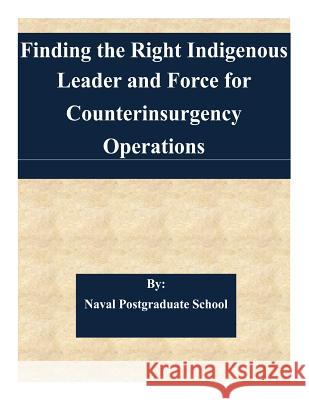Finding the Right Indigenous Leader and Force for Counterinsurgency Operations » książka
Finding the Right Indigenous Leader and Force for Counterinsurgency Operations
ISBN-13: 9781508702351 / Angielski / Miękka / 2015 / 68 str.
Finding the Right Indigenous Leader and Force for Counterinsurgency Operations
ISBN-13: 9781508702351 / Angielski / Miękka / 2015 / 68 str.
(netto: 49,36 VAT: 5%)
Najniższa cena z 30 dni: 50,97
ok. 16-18 dni roboczych.
Darmowa dostawa!
In recent decades, insurgents and other nonstate actors with their nontraditional styles of warfare have become significant threats to the U.S. and its allies. Failing to draw lessons from past conflicts has been a root cause of the misguided strategies implemented against insurgents in both Iraq and Afghanistan. Combating these insurgencies using a military-heavy strategy has proved to be a drain on both the U.S. economy as well as the military forces that have shared the burden of deployments since the onset of operations Enduring Freedom and Iraqi Freedom. As a result, the U.S. should consider alternative strategies for dealing with insurgents that are both more tactically sound and less taxing on the economy and military. Using special operations forces (SOF) to establish local indigenous security forces in under-governed areas is one means of accomplishing this goal. This thesis focuses on the importance of choosing the right indigenous leader and force for U.S. SOF to partner with to defeat insurgents through the establishment of security, governance, and development at the grassroots level. A step-by-step process is described in this thesis that will assist SOF units in choosing the best local indigenous force leader (LIFL) and training him and his force. Also discussed is the importance of maintaining that partnership until the LIFL and his force are capable of operating on their own, and lines of support and communication have been opened with higher levels of the host nation government.
Zawartość książki może nie spełniać oczekiwań – reklamacje nie obejmują treści, która mogła nie być redakcyjnie ani merytorycznie opracowana.











